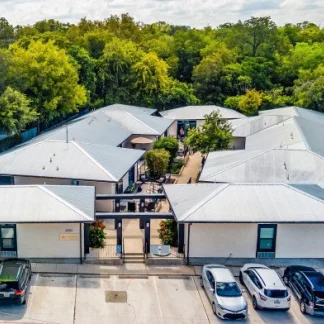Treatment Associates
Treatment Associates offers counseling focused on relapse prevention. Treatment ...
The New Choices Treatment Center is a luxury treatment drug and alcohol addiction rehab center in San Antonio, Texas. This CARF-accredited facility provides a courtyard-style community living environment along with individualized care to those who struggle with addiction and co-occurring mental health disorders.
New Choices Treatment Center provides a full continuum of care that includes the following treatment programs and services:
New Choices offers a medically managed detox program. This ensures individuals safely navigate the initial stages of recovery under the supervision of medical professionals.
The residential treatment program at New Choices provides a structured setting. By combining evidence-based therapeutic methods with compassionate care, the center fosters an atmosphere conducive to healing and personal growth. During their stay, residents can engage in various therapeutic, recreational, and holistic activities.
A distinguishing feature of New Choices is its emphasis on holistic and recreational activities. From yoga, meditation, and art therapy to outdoor recreational pursuits, these activities aim to heal the soul, strengthen the body, and rejuvenate the mind.
For those in need of a more structured outpatient setting, the intensive outpatient program (IOP) provides more rigorous therapeutic sessions. This approach offers comprehensive care, while still permitting individuals to manage their personal and professional responsibilities.
New Choices emphasizes the importance of aftercare. This program offers continued support, guidance, and resources to individuals, ensuring they remain steadfast on their path to sobriety.
Contact us for more information: (405) 618-0988

Connect with New Choices Treatment Center by calling their admissions team directly.
(405) 618-0988 Website Get DirectionsThe Joint Commission, formerly known as JCAHO, is a nonprofit organization that accredits rehab organizations and programs. Founded in 1951, the Joint Commision's mission is to improve the quality of patient care and demonstrating the quality of patient care.
Joint Commission Accreditation: Yes
Research clearly demonstrates that recovery is far more successful and sustainable when loved ones like family members participate in rehab and substance abuse treatment. Genetic factors may be at play when it comes to drug and alcohol addiction, as well as mental health issues. Family dynamics often play a critical role in addiction triggers, and if properly educated, family members can be a strong source of support when it comes to rehabilitation.
Group therapy is any therapeutic work that happens in a group (not one-on-one). There are a number of different group therapy modalities, including support groups, experiential therapy, psycho-education, and more. Group therapy involves treatment as well as processing interaction between group members.
In individual therapy, a patient meets one-on-one with a trained psychologist or counselor. Therapy is a pivotal part of effective substance abuse treatment, as it often covers root causes of addiction, including challenges faced by the patient in their social, family, and work/school life.
Group therapy is any therapeutic work that happens in a group (not one-on-one). There are a number of different group therapy modalities, including support groups, experiential therapy, psycho-education, and more. Group therapy involves treatment as well as processing interaction between group members.
In individual therapy, a patient meets one-on-one with a trained psychologist or counselor. Therapy is a pivotal part of effective substance abuse treatment, as it often covers root causes of addiction, including challenges faced by the patient in their social, family, and work/school life.
In individual therapy, a patient meets one-on-one with a trained psychologist or counselor. Therapy is a pivotal part of effective substance abuse treatment, as it often covers root causes of addiction, including challenges faced by the patient in their social, family, and work/school life.
Treatment Associates offers counseling focused on relapse prevention. Treatment ...
Northeast Baptist Hospital – ACE Unit is a private rehab located in San Antonio,...
The Right Step – San Antonio Alcohol & Drug Rehab Center is a private rehab ...
Alpha Home is a private rehab located in San Antonio, Texas. Alpha Home speciali...